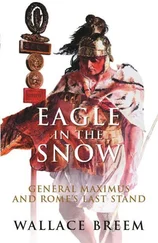“To-morrow.”
“I did not like that bishop.”
“Nor I. We shall have to be careful or we may offend him.”
“Pagans.”
“Of course.”
We both laughed.
“Must we start so soon?”
“Yes. The sooner the troops are split into their camps and at work, the better. If everything remains quiet they can be sent back to Treverorum on leave in groups.”
“Don’t you trust them any longer?” He glanced at me with a guarded expression on his face.
I hesitated. “They have not been paid in months and it will take time to get money out of this over-taxed province.”
“We have had no trouble so far. They were glad to leave Italia.”
“Yes. There, they were part of an army. Here, they are the army. Their sense of their own importance may swell if they have too much leisure.”
I leaned out of the window and watched the sentries of the auxilia leaning on their spears while the customs officials checked, with unusual thoroughness, a waggon train of supplies waiting to enter the city. The merchant owner was expostulating bitterly, both at the delay and at the charges he was expected to pay.
I turned my head. “It is odd that so many were absent whom I expected to meet here.”
“But their reasons were good.”
“Oh, yes, excellent. Our young Curator forgot to mention only what had kept the General of Gaul away.”
Quintus said reprovingly, “You mean the Magister Equitum per Gallias. He will be offended if you call him less.”
“They change the titles so often I find it hard to keep up with them.”
“He will have a good excuse, no doubt. Perhaps he was hurt boar hunting. It is a sport I believe he is keen on.”
“Perhaps.”
Quintus said anxiously, “Don’t look for trouble, Maximus. Except the governor, they are all appointments of Stilicho. We shall get all the help we need. I am certain of it.”
I frowned. I said, “I hope you are right.”
Later, we stood in the Cardo Maximus behind Romulus, watching the cavalry groom their horses while the stall-holders watched us with resentful curiosity.
“We shall have to move them to-morrow or the good citizens of this city will never forgive us.”
“Naturally.”
I turned and looked at Romulus. Through these gates, like a steel sword, slipped the great military road that ran to Moguntiacum, once the supply town for the abandoned Limes on the east bank of that river I now had to defend. There at Moguntiacum the road ended on a broken bridge. And beyond were the green woods, thick and impenetrable, wet with rain in winter and heavy with scent in summer, in whose shelter lived those peoples whom we of Rome had never conquered. This was the road down which Quinctilius Varus had gone to lead three legions to defeat and death in the Teutoburg forest. It was along this road that countless legates had marched at the head of their men on their way to the east and the barbarian darkness beyond. It was a road to nowhere.
The next day we rode round the city on a tour of inspection. As befitting the capital of a province that once had sheltered the emperors of Rome, it still bore the signs of great luxury and great wealth. But, even here, one could see and feel the marks of that decay which, like the rot-holes in a piece of wood, were eating the heart out of city life.
The town stood on the east bank of the Mosella, a wide, lazy river that crept indolently, like a snake in the summer sunlight, between steep banks and sheer cliffs until it joined the Rhenus. Outside the west gate, which was another Romulus in size, stood the bridge, and the road beyond coiled and shifted its way to Colonia, a small garrison town on the west bank of the Rhenus. Below the bridge there were docks and warehouses where, in the old days, the Rhenus fleet that escorted the troop transports on their long voyage to Britannia, would put in for repairs or lie up during the winter months when the loose ice that swept down the main river made navigation too dangerous for safety. Now, only a few merchant ships were tied up, loading their cargoes of wine, while the slim hulks of the warships rotted upon the hard till they were stripped bare by the poor in search of free timber for their fires.
“We could do with a fleet to patrol the river,” I said.
“They couldn’t build them in time.”
“No. But we might do something with the boats belonging to our fat merchant friends down there. One of the tribunes in the third cohort was on the Saxon Shore for a time. I forget his name—Gallus, yes that’s it. Get hold of him and put him in charge.”
I looked at the skyline. The city was hemmed in by hills on every side. Like a rabbit in a bear pit, I thought.
“Is it all like this?”
“Yes, sir,” said the decurion who had arrived the week before with the advance party. “The whole district is a mass of hills and tiny valleys. Most of them are only connected by straggling paths. Each valley has its own village. And that usually means only a cluster of timbered huts and a handful of goats.”
The hills were formidable, their lower slopes lined with vine orchards. Above the vines were outcrops of rock and thick scrub and above them, higher still, the hills were thick with trees, while forests of pine covered their rounded crests like the dark caps worn by Jewish traders.
“At least we shall not die thirsty,” said Quintus, carefully. He was thinking of the wine that was sold in fat barrels in the forum market and then sent by ox-cart to all the distant parts of Gaul.
“I shall want the legion to parade to-morrow in the Circus Maximus for their orders. It will impress the city. We shall need more horses. Some of ours are only fit as remounts.”
Quintus said, “Don’t worry about that. The Treveri are famous horse breeders. I met one this morning and he asked if I needed animals. I told him I had eighteen hundred and he grinned and said, ‘You have brought owls to Athens.’”
The decurion asked, “When will you see the officers?”
“At the third hour. I will give my orders then.”
The city walls stood nearly twenty-five feet high and were ten feet thick. Not even our Wall—the Wall of Hadrian—had been so great. I never heard of a city in my life that had walls like this. The limestone wall, supported at intervals by guard towers (there were forty-seven of them) had been badly damaged in the great disaster of 278 and the scars still showed. Great gaps that had been torn in the original stone were now filled in with crude messes of rubble taken from damaged buildings and then hastily cemented together.
We rode round on our tour of inspection and it was obvious at once that, massive as these fortifications were, the city was too large to defend without a larger force than I could afford to leave behind. I had no intention of being trapped within its walls. On the east side was the amphitheatre, sited between the walls, and capable of holding twenty thousand people at a popular show. It was regularly cursed by the christian priests as a place of abomination but, in this respect, so I was told, their views had little effect upon the passions of the populace. In addition to the amphitheatre entrance there was yet a fifth gate to the south-east, of the same size as the others and equally impressive in appearance.
On our return to Romulus we rode through the district where the majority of the temples had once stood; temples to Jupiter, to Victory, to Epona, to Diana and to other gods, many of them local deities of whom I had never heard. Some had been pulled down and christian churches erected in their place. Others had been abandoned and were slowly being stripped of their stone for the building of dwelling houses, while the bishop and the priests looked on and approved. Quintus and I looked at each other but said nothing. What was there to say? The great statue of Victory in Rome itself, which had been for six hundred years the very spirit of my people, had now been cast out and it was forbidden by imperial edict to worship in the old way, each man according to his own desires, each man following his own path to the heart of his existence. But I—I was too old to change. I, who had prayed to her god that she might live. I was a part of the old Rome, and I should be dead myself if I proved a bad general. Meanwhile the new Rome still had a use for me.
Читать дальше












